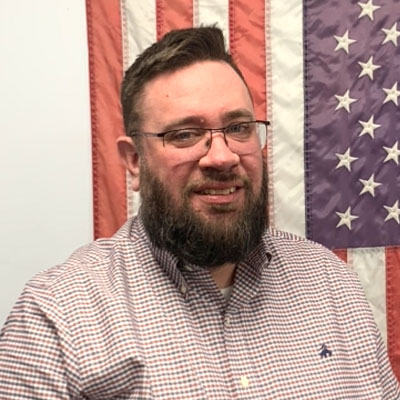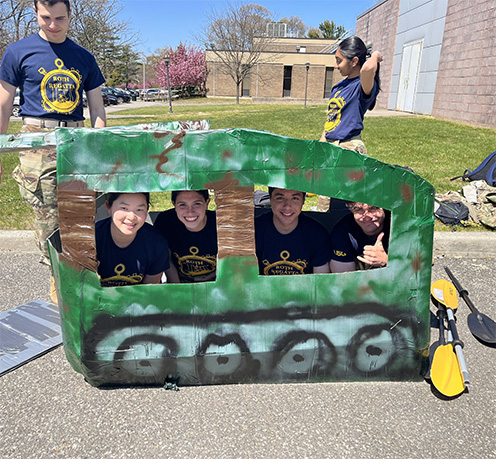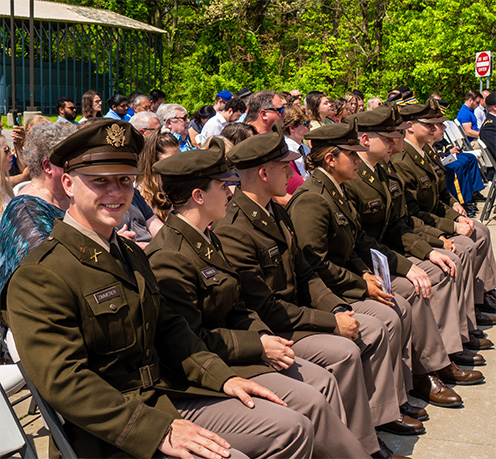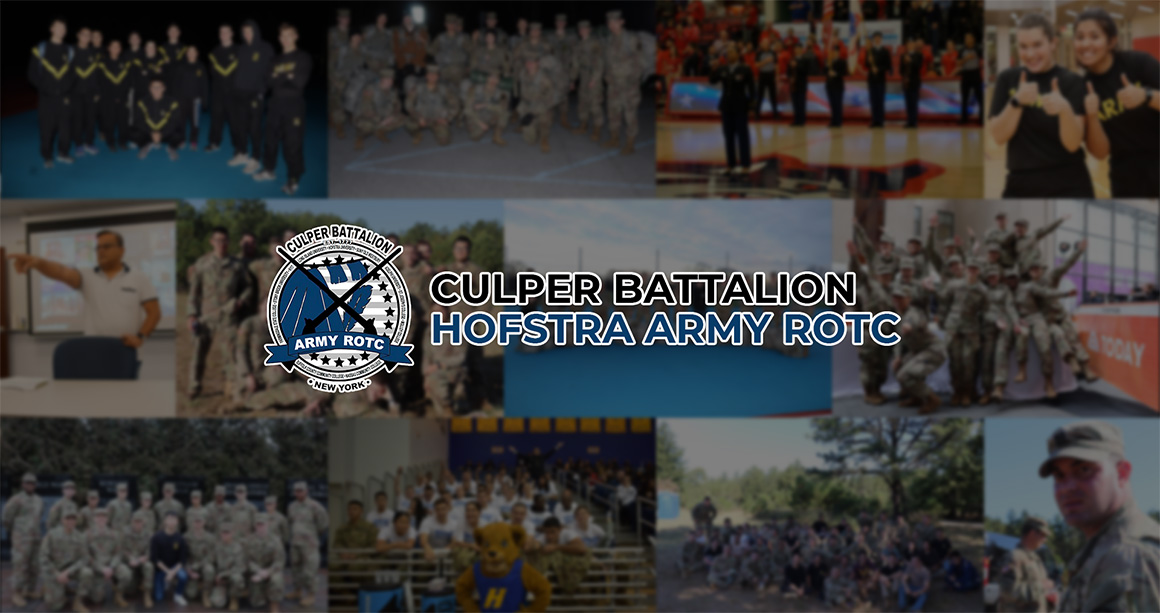

The Hofstra Army Reserve Officer's Training Corps (ROTC) Culper Battalion qualifies students for appointment as a commissioned officer in the United States Army, Army Reserve or Army National Guard. Students attend Military Science classes during their regular course of studies. Students develop maturity, responsibility, and dependability while earning the Gold Bar of an Army Second Lieutenant.
For information, please call 877-463-ROTC or visit us in Room 135 Oak Street Center. (Campus directions.)
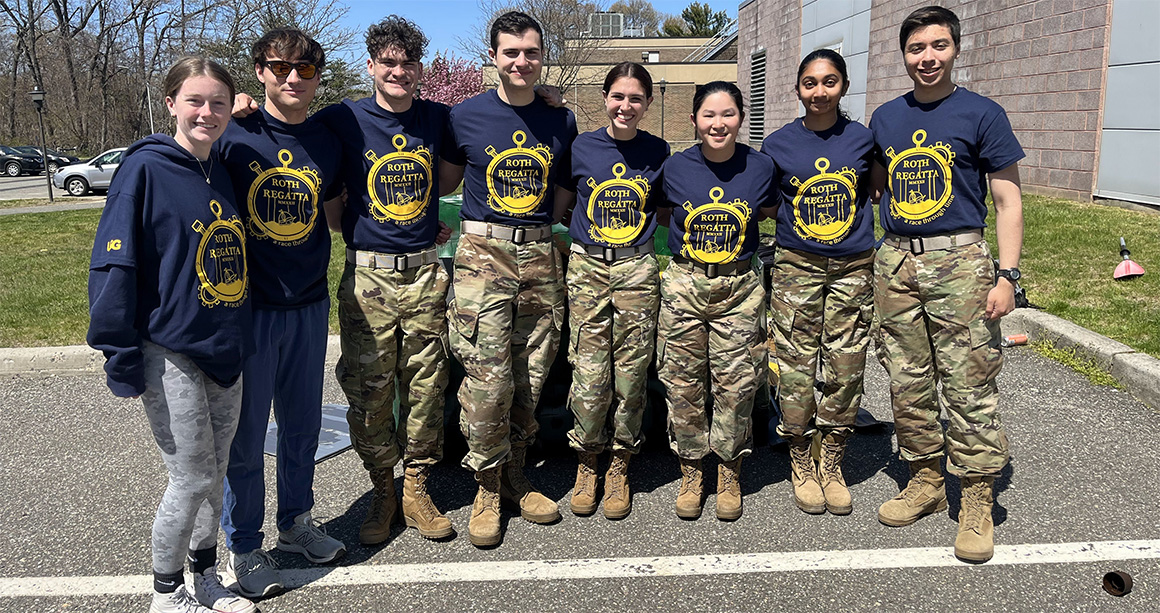
About Hofstra Culper Battalion ROTC
Mission Statement
The Culper Battalion ROTC recruits, retains, develops, and graduates resilient adaptive leaders who are mentally, physically, emotionally, and morally ready to serve our Nation as commissioned officers in the U.S. Army.
Vision Statement
Culper Battalion prepares our cadets to “See All, Fear None” by empowering college students through caring leadership and positive influence to serve their country and develop themselves personally and professionally. Culper Battalion fosters the creation of a diverse group of disciplined, professional, and adaptive lifelong leaders of the U.S. Army and Nation.
Our Program
Hofstra ROTC Culper Battalion boasts a student population of approximately 70 cadets from colleges and universities throughout Long Island, with Stony Brook University serving as an official extension school.
Cadets can go to either Hofstra University or Stony Brook University to attend physical training, classes, and labs, while attending their regular classes at their respective university.
Hofstra's ROTC hosts students from:
- Adelphi University
- LIU Post
- Molloy University
- Nassau Community College
- St. Joseph's University (Long Island Campus)
- Suffolk Community College
- SUNY Farmingdale
- SUNY Old Westbury
The recommended track for completing the ROTC commissioning program is to begin the first semester of the first year of college. However, there are several ways to condense the time frame for students who have less than four years remaining until graduation, including enlisting in the Army National Guard or U.S. Army Reserve, or attending the Leader’s Training course.
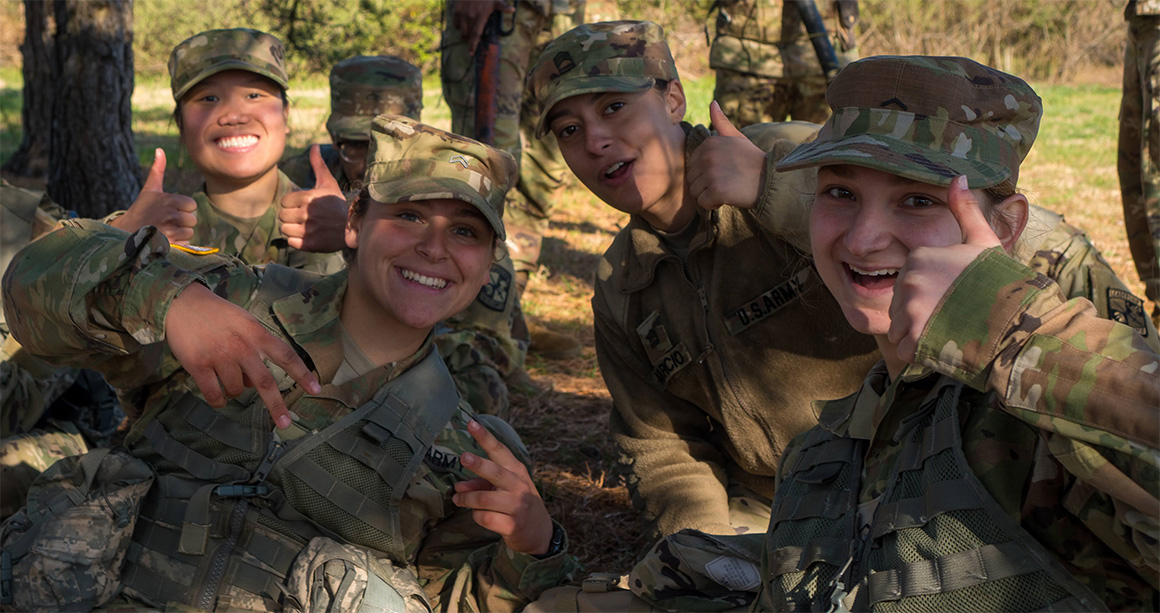
Physical Training, Class and Lab Schedule
Hofstra University and Cross-Towns Colleges and Universities within driving distance:
Monday:
PT 0600-0715
Class: 0800-0925
Wednesday:
PT 0600-0715
Class: 0800-0925
Friday:
LAB 0800-1000
Stony Brook University and Cross-Town Colleges and Universities within driving distance:
Tuesday:
PT 0600-0715
Class: 0800-0925
Thursday:
PT 0600-0715
Class: 0800-0925
Friday:
LAB 0800-1000
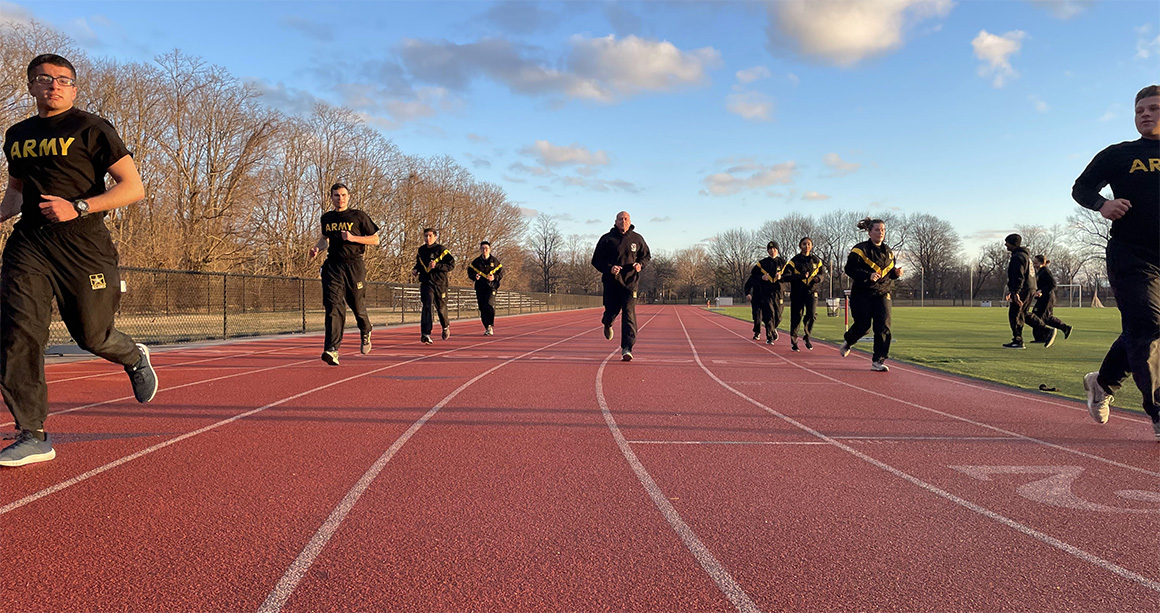
Four and Two Year Programs
Army ROTC offers two different programs to all qualified college and university students. The traditional four-year program gives students the opportunity to take ROTC courses in each of their four years of college. The two-year program is available for any qualified student who did not take ROTC during their first two years of college.
Four-Year Program
The four-year program consists of the basic and the advanced courses. The basic course is open to all Hofstra students. It consists of training in leadership, management, military skills, and physical fitness. Students learn to apply these skills in and outside the classroom. In addition, a variety of outside social and professional enrichment activities are available. ROTC textbooks, uniforms, and other essential materials for the basic course are furnished to the students. Sophomores who did not take 1C and 1D may compress 1C and 2C and 1D and 2E to complete the basic course. There is no military obligation for enrolling in the basic ROTC course.
After they have completed the basic course, students who have demonstrated the potential to become officers and who have met the physical and scholastic standards are eligible to enroll in the advanced course. The advanced course is usually taken during the last two years of college. It includes instruction in management, tactics, ethics, and further leadership development. Textbooks and uniforms in the advanced course are also furnished to students.
During the summer between their junior and senior years of college, advanced course Cadets attend Cadet Summer Training (CST), a paid, five-week training session. CST gives Cadets the chance to practice what they have learned in the classroom and introduces them to Army life "in the field."
Two-Year Program
The two-year program is designed for students who did not take ROTC during their first two years of school or students entering a two-year, post-graduate course of study. To enter the two-year program, students must attend a paid four-week Leader’s Training course held during the summer between their sophomore and junior years of college. Students who complete this training can then enroll in the advanced course.
Active Army veterans, members of the National Guard, and US Army Reserve may qualify for credit for the basic course and be enrolled directly into the advanced course.
Note: All basic Military Science courses include the appropriate number of class hours, plus physical training two days a week and a required leadership laboratory. A field training exercise of approximately three days once a semester provides practical experience in small organization leadership. All students are expected to attend the leadership laboratory, physical training, and field training exercise.
Courses MS 1C and 1D, and 2C and 2D (totaling 2 semester hours credit) are designated non-liberal arts credits. These credits are acceptable toward a baccalaureate degree if they fall within the total non-liberal arts credits allowed for that degree. The MS 3A, 3B, Summer Camp, and MS 4C, 4D total 12 semester hours credit. These credits are acceptable toward a degree as determined by advisement with the department chair.
Cadre and Staff
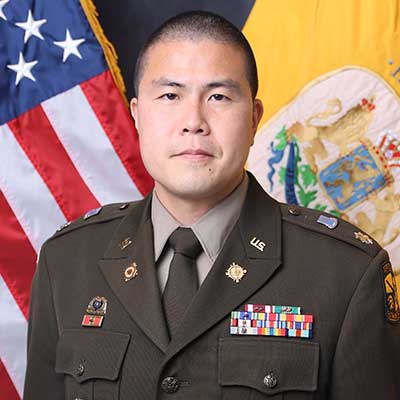
Lt. Col. Houng Lee
Professor of Military Science/Department Chair
Phone: 516-463-5312
Office: Room 019 Oak Street Center
Email
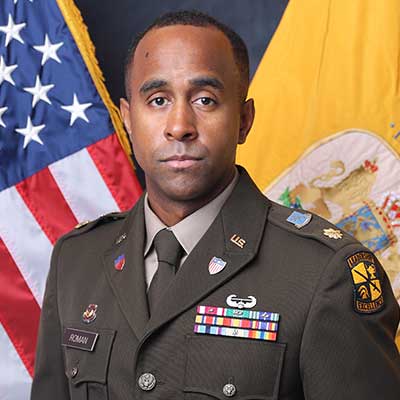
Maj. Matthew Roman
Assistant Professor of Military Science, XO
Phone: 516-463-6508
Office: 017 Oak Street Center
Email
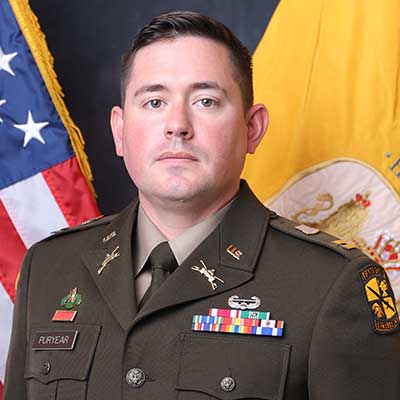
Capt. Jordan Puryear
Assistant Professor of Military Science
Instructor
Phone: 516-463-7595
Office: 015 Oak Street Center
Email
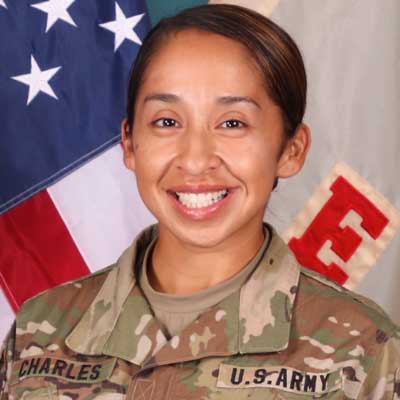
Capt. Shirley Charles
Assistant Professor of Military Science
Phone: 516-463-6502
Office: 018 Oak Street Center
Email
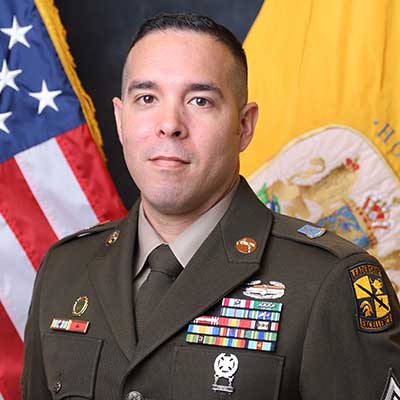
Sgt. 1st Class Justin Siler
Military Science Instructor
Phone: 631-632-4873
Office: Stony Brook Union Building
Email

Sgt. 1st Class Adam Seals
Military Science Instructor
Phone: 516-463-6380
Office: 014 Oak Street Center
Email
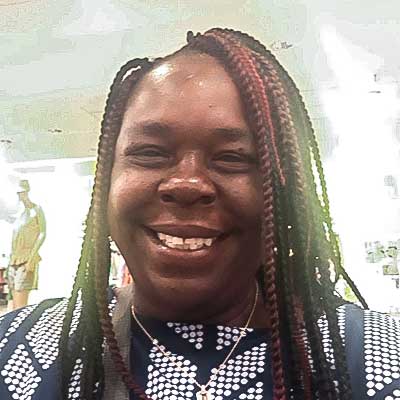
Jennifer Wilkinson
Human Resource Specialist
Phone: 516-463-5311
Office: Room 022 Oak Street Center
Email
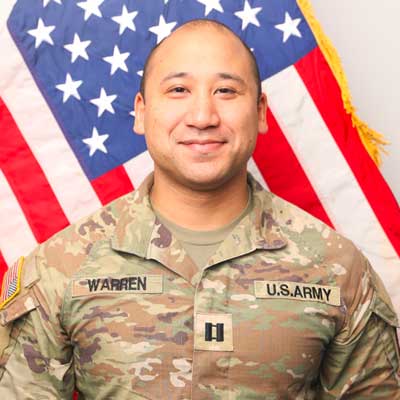
CPT Toshio Warren
Assistant Professor of Military Science
Phone: 516-463-5648
Office: 101 Oak Street Center
Email
Hofstra ROTC History
Army ROTC began at Hofstra in 1951. The Army was, and continues to be, the only service to have an ROTC program on campus. From the beginning and until 1968, ROTC was a mandatory program for all freshmen and sophomores. With the expansion of the school in the early 1960s, Hofstra’s ROTC brigade was typically at strength of 2,000 Cadets, one of the largest programs in the country.
In its decades of existence at Hofstra, Army ROTC has commissioned close to 1,300 lieutenants. Among the more illustrious ROTC alumni are Major General Patrick Higgins and Mr. Frank G. Zarb, for whom Hofstra's School of Business is named.
ROTC Fits Me
Soldiers who are interested in the Army ROTC program are encouraged to contact Recruiting Operations via email: ArmyRotc@hofstra.edu or please call (516) 362-9698 to learn more about the program
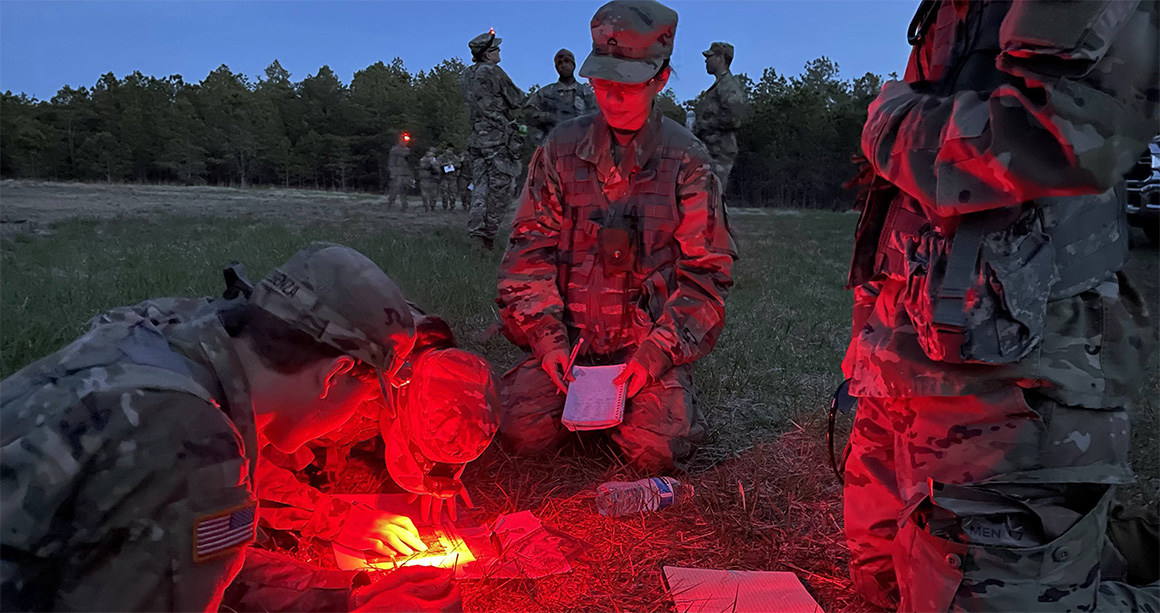
Information for High School Students
High school students should fill out an Army ROTC application to compete for a four-year ROTC scholarship. Students are also encouraged to read the ROTC FAQ on High School Scholarships & Enrollment.
Prior Service Soldiers
The Army ROTC program is an excellent way for prior service soldiers to take the next step in their military career. Soldiers who have served in the enlisted ranks prior to joining the program find that their enlisted experience provides an excellent base to the leadership training they receive in ROTC.
Soldiers who have already completed Army Basic Training are only required to complete the last two of the four years required of the Army ROTC commissioning program. However, we encourage students to participate in the program as early as possible. It is also important to contact the ROTC enrollment officer well in advance of joining the program to allow time for application and medical processing.
Army National Guard and Reserve Members
Army National Guard and Reserve members often find that Army ROTC is a great way to further their Army careers. Students attend all their classes for their major and include one Army ROTC course while continuing to drill with their units.
Once students are contracted with ROTC, they will become part of the Simultaneous Membership Program (SMP). As members of the SMP, Soldiers drill as Cadets in their unit and shadow an officer.
The SMP program is designed to give Cadets the opportunity to gain hands-on leadership experiences while progressing through the ROTC program.
Nursing Students
The Army, like the civilian community, needs highly qualified nurses. Students who plan to receive a bachelor's degree in nursing are encouraged to consider the outstanding opportunities available to Army nurses. The Army ROTC program will teach you to be a strong leader while preparing you to accept a commission as a second lieutenant in the Army.
Once you are on active duty, you will quickly be put in positions of responsibility. You will also receive specialty training after the first year in one of the following areas: critical care nursing, community health nurse, emergency nurse, OB/GYN nursing, preoperative nursing, and psychiatric/mental health nursing.
Nurses who choose to remain in the military as a career are also eligible to apply for a fully funded master's program in one of the following areas: anesthesia nursing, family nurse practitioner, health care nursing, nursing administration, and more.
Interested students should contact the Army ROTC to learn more about Army nursing opportunities and nursing scholarships. To find out more, visit the Army ROTC Nursing website.
ROTC Ranger Challenge
Through the Ranger Challenge program, Cadets participate in a tough mental and physical competition, enhance their leadership skills, develop team cohesion, and foster healthy competition among ROTC battalions. Each year, top cadets from around the country gather to compete against one another. Training for this intensive competition is six weeks long.
Work Out with the Ranger Challenge Team!
Even if you do not want to join the Ranger Challenge team, you are encouraged to work out and prepare with the team. These workouts will improve your leadership abilities, military skills, and physical fitness.
The events conducted during the competition are:
- Army Combat Fitness Test
- Patrolling Written Examination
- Orienteering (Land Navigation)
- BRM (Basic Rifle Marksmanship)
- M16 Disassembly and Assembly
- One Rope Bridge Assembly and Crossing
- Obstacle Course
- 10K RUCK Run
- Hand Grenade Assault Course
ROTC - What It Involves
Army ROTC provides college students the skills and leadership training to become officers in the U.S. Active Army, Army Reserve, and Army National Guard.
Cadets develop maturity, responsibility, leadership ability, self-confidence, and other qualities essential to success in any field. The program stresses written and oral communication, physical training, first aid, land navigation, and ethics.
Upon successful completion of ROTC, cadets receive commissions as second lieutenants in one of the Army's specialized branches.
Benefits
- Two, three, and four-year scholarships that cover full tuition and fees or room and board are available to qualified applicants and cadets
- $1,200 annually for books and expenses
- $425 (per month) tax-exempt spending allowance for contracted Cadets
- Commission as a second lieutenant
Obligations
No obligation during first and sophomore years for non-scholarship cadets.
Commissioned second lieutenants serve on active, reserve or National Guard duty.
To join Army ROTC, you must be:
- Age requirement: Maximum 30 years of age for scholarships
- Age requirement: Maximum 34 years of age for non-scholarships (exceptions considered)
- A U.S. citizen in good health
- A first-year or sophomore
- A full-time college student
- To join, you must be an undergraduate or graduate with two years remaining.
Curriculum
First-years and sophomores enroll in a ½-credit course, which meets for 3 ½ hours for one day a week. In the classroom portion of instruction, they study subjects including leadership, team building, problem-solving, and oral communication. During the lab portion of the curriculum, they receive training on first aid, land navigation, tactics, marching, and marksmanship.
Cadets also participate in Physical Training (PT) two days a week in the morning. Cadets learn how to conduct PT to the Army standard while increasing their flexibility, endurance, muscular strength, and aerobic capacity.
In addition to the classroom, lab instruction, and PT, cadets participate in one Field Training Exercise (FTX) over a weekend per semester. Cadets receive more in-depth training on subjects covered in class and lab. In addition, they are given the opportunity to go to a rifle marksmanship range, to rappel, and to train with cadets from neighboring schools.
Juniors and seniors enroll in a 3-credit course that meets for 1½ hours for one day a week in addition to the 3½-hour course that first-years and sophomores attend. They study subjects including advanced leadership and management, small-unit tactics, and military ethics.
Branches of the Army
The United States Army has many opportunities in a wide array of career fields - check them out!
AIR DEFENSE ARTILLERY (ADA) - Protects and defends the third dimension-AIRSPACE-against aircraft and missiles with systems such as the Patriot and Stinger. Click here to visit Fort Bliss - The Home of ADA.
AVIATION (AV) - The largest air force in our nation, including transport, utility, scout, and attack helicopters. Aviation officers serve in all aspects associated with flight operations. Click here to visit Fort Rucker - The Home of Aviation.
ARMOR (AR) - The heritage of the U.S. Horse Cavalry. This is the Mounted Arm of Decision and the proponent for Scouts and Reconnaissance. Click here to visit Fort Benning-The Home of the Armor.
INFANTRY (IN) - Forms the nucleus of the Army's fighting strength. The mission is to maintain a state of readiness in preparation for combat worldwide. Click here to visit Fort Benning - The Home of the Infantry.
FIELD ARTILLERY (FA) - This is the fire support branch of cannons, rockets, and missiles. This branch also coordinates all supporting fires of artillery, air power, and naval gunfire. Click here to visit Fort Sill - The Home of Field Artillery.
ENGINEERS (EN) - This area includes such fields as combat, construction, topographic, civil works, environmental engineering, and other specialties. Click here to visit Fort Leonard Wood - The Home of the Engineer Corps.
MILITARY POLICE (MP) - MP officers must be prepared to conduct wartime rear area operations as well as peacetime law enforcement, criminal investigation, counterterrorism, physical security, and corrections. Click here to visit Fort Leonard Wood - The Home of the Military Police.
MILITARY INTELLIGENCE (MI) - One of the largest branches with specialties in tactical intelligence, counterintelligence, signals and electronic intelligence security, surveillance, and aerial reconnaissance. Click here to visit Fort Huachuca- The Home of the Military Intelligence.
SIGNAL (SC) - To function, an Army must communicate. The Army uses all types of radio and cellular phone technology as well as satellites, lasers, and computer systems. Assignments range from the tactical level to the White House Communications Agency. Click here to visit Fort Gordon - The Home of Signal.
CHEMICAL (CM) - This area includes assignments in operations, logistics, training, intelligence, research, and analysis. Click here to visit Fort McClellan - The Home of Chemical.
ADJUTANT GENERAL (AG) - These are the personnel people for the Army. AG officers manage all personnel systems within the Army that impact on unit readiness, morale, and career patterns. Click here to visit Fort Jackson-The Home of the Adjutant General Corps.
TRANSPORTATION (TC) - This includes all activities to move people, equipment, and supplies to include all land, sea, and air transport systems. Click here to visit Fort Eustis - The Home of the transportation Corps.
FINANCE (FC) - These are the money and pay people for the soldiers. All aspects of pay, allowances, accounting, and contracting involve finance officers. (Role requires a degree in business, accounting, or computer science.) Click here to visit Fort Jackson-The Home of the Finance.
QUARTERMASTER (QM) - The "Sustainers of the Army" plan and direct all activities that provide food, water, petroleum, repair parts, weapon systems, and field services (laundry, telephone, parachute rigging, etc.) to soldiers. Click here to visit Fort Lee - The Home of Quartermaster.
ORDNANCE (OD) - The largest branch that develops, produces, acquires, and supports the Army's weapon systems, ammunition, missiles, and wheeled and tracked vehicles. Specialties are Tank/Automotive, Missile/Electronics, and Munitions material management as well as Explosive Ordnance Disposal (EOD). Click here to visit Fort Lee-The Home of the Ordnance Corps.
BACCALAUREATE SPECIALTY BRANCHES
ARMY NURSE CORPS (ANC) - A Bachelor of Science in Nursing also makes you an officer and a leader in the ANC. All ANC officers are trained in clinical specialties such as intensive care, operating room nursing, community health and environmental science, obstetrics and gynecology, and psychiatric nursing. Most Army nurses who choose to remain in the service after their initial obligation go on to earn advanced degrees in nurse anesthesia, nurse midwifery, healthcare administration, and other master's degree programs, as well as doctoral study in nursing science, education, or administration.
MEDICAL SERVICE CORPS (MEDSERVE) - The supply and administration section includes positions at all medical facilities in supply and administration as well as tactical assignments. Medical Air Evacuation pilots are subcategory of this branch.
MEDICAL SPECIALIST CORPS (MSC) - These are the Army's dietitians, physical therapists, and occupational therapists.
ADVANCED DEGREE BRANCHES MEDICAL CORPS - These doctors of the Army come from medical schools across the nation including the military's own Uniformed Services University of the Health Sciences, F. Edward Hebert School of Medicine.
DENTAL CORPS - Members must have a degree of Doctor of Dental Surgery or Doctor of Dental Medicine.
MEDICAL SERVICE CORPS - This area includes pharmacy, optometry, and podiatry.
VETERINARY CORPS - Management and care of laboratory animals, biomedical research, food hygiene and nutritional quality, and preventive medicine.
JUDGE ADVOCATE GENERAL (JAG) - This officer provides legal services for the Army and its soldiers. JAG officers serve as prosecutors and defense attorneys in military, state, and federal courts. Must be a graduate of an accredited law school.
More about Hofstra ROTC Culper Battalion
Courses
The Hofstra Army Reserve Officer's Training Corps (ROTC) program qualifies students for appointments as officers in the United States Regular Army, Army Reserve or Army National Guard. Students attend military science classes during their regular course of studies. Students develop maturity, responsibility and dependability while earning the Gold Bar of an Army Second Lieutenant.
Army ROTC offers two different programs to all qualified college and university students. The traditional four-year program gives students the opportunity to take ROTC courses in each of their four years of college. The two-year program is available for any qualified student who did not take ROTC during their first two years of college.
The four-year program consists of the Basic Course and the Advanced Course. The Basic Course is open to all Hofstra students. It consists of training in leadership, management, military skills and physical fitness. Students learn to apply these skills in and outside the classroom. In addition, a variety of outside social and professional enrichment activities are available. ROTC textbooks, uniforms, and other essential materials for the Basic Course are furnished to the students. Sophomores who did not take 1C and 1D may compress 1C and 2C and 1D and 2E to complete the Basic Course. There is no military obligation for enrolling in the Basic ROTC Course.
After they have completed the Basic Course, students who have demonstrated the potential to become an officer and who have met the physical and scholastic standards are eligible to enroll in the Advance Course. The Advanced Course is usually taken during the last two years of college. It includes instruction in management, tactics, ethics and further leadership development. Textbooks and uniforms in the Advanced Course are also furnished to students.
During the summer between their junior and senior years of college, Advance Course cadets attend a paid five-week training session called the Leadership Development and Assessment Course (LDAC). LDAC gives cadets the chance to practice what they have learned in the classroom, and introduces them to Army life "in the field".
The two-year program is designed for students who did not take ROTC during their first two years of school or students entering a two-year post-graduate course of study. To enter the two-year program, students must attend a paid four week course called the Leader’s Training Course held during the summer between their sophomore and junior years of college. Students who complete this training then enroll in the Advanced Course.
Active Army veterans, members of the National Guard, and the Reserves may qualify for credit for the Basic Course and be enrolled directly into the Advance Course.
Note: all basic Military Science courses include the appropriate number of class hours, plus a required leadership laboratory and additional classes in physical training each week. A field training exercise of approximately three days once a semester provides practical experience in small organization leadership. All students are expected to attend the leadership laboratory, physical training and field training exercise.
MS 1C, 1D and 2C, 2D, totaling two semester hours credit, are designated non-liberal arts credits. These credits are acceptable toward a baccalaureate degree if they fall within the total non-liberal arts credits allowed for that degree. MS 3A, 3B, Summer Camp, and MS 4C, 4D total 12 semester hours credit. These credits are acceptable toward a degree as determined by advisement with the department chairperson.
Contact us
For information, please call 877-463-ROTC or call David Ruckdeschel at 516-362-9698
Are you an alum?
If you are an alum who is a commissioned officer (active, reserve, or retired), please contact us with your graduation information for historical purposes.

